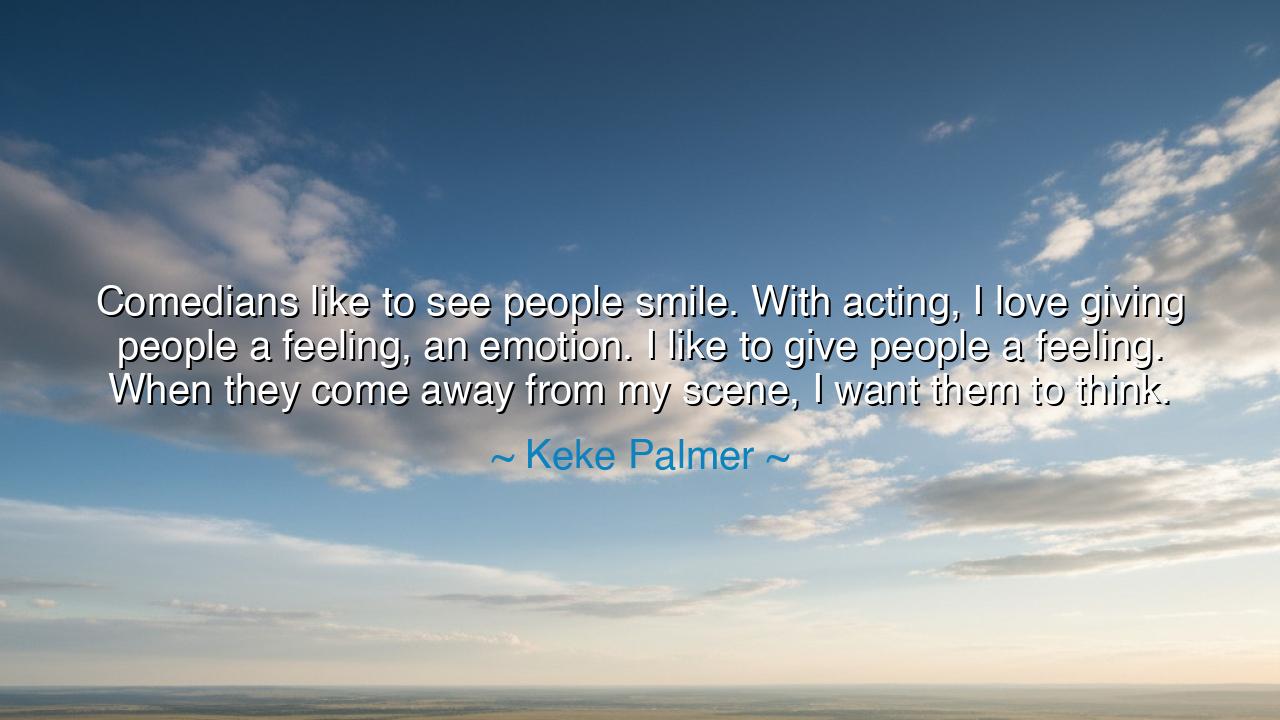
Comedians like to see people smile. With acting, I love giving
Comedians like to see people smile. With acting, I love giving people a feeling, an emotion. I like to give people a feeling. When they come away from my scene, I want them to think.






Hear now the words of Keke Palmer: “Comedians like to see people smile. With acting, I love giving people a feeling, an emotion. I like to give people a feeling. When they come away from my scene, I want them to think.” In this utterance lies the ancient recognition that art, whether through laughter or through drama, is not idle entertainment but a sacred exchange between soul and soul. The comedian offers joy, lifting the heart from its burdens, while the actor casts before us the mirror of existence, stirring within us the tides of thought, empathy, and remembrance.
In the laughter of the comedian, we see the echo of Dionysus, the god who brought both wine and mirth to mortal kind, loosening the chains of sorrow. A smile is no small gift—it is a balm to the weary, a light in the dark chamber of the heart. Yet Keke Palmer speaks of another craft, one no less divine: the power of emotion, of awakening in the audience the depths of what it means to be alive. To leave the theater not only entertained but thinking—this is the mark of true art, the art that transforms.
Consider the story of Harriet Beecher Stowe, whose novel Uncle Tom’s Cabin was said by Abraham Lincoln himself to have helped awaken the conscience of a nation. She did not merely write words for comfort; she stirred feeling in her readers, igniting compassion, grief, and righteous anger. Her art made people think about slavery, not as a distant institution, but as human suffering burning in the heart of their own land. In her work, as in Palmer’s vision of acting, the gift of emotion became the seed of action and change.
The ancients knew that art was a vessel of truth. In the tragedies of Athens, the people beheld the fall of Oedipus, the suffering of Antigone, and in those stories, they learned not only the frailty of kings but the cost of defiance, the weight of destiny, and the courage to stand for justice. Such plays were more than entertainment; they were a kind of civic ritual, a way to purify the soul through feeling, and to teach wisdom through reflection. Palmer’s words are a modern echo of this ancient practice, calling upon actors to be not merely performers, but teachers of the heart.
Yet one must not dismiss the laughter of the comedian, for even in that joy lies truth. In times of war and plague, clowns and jesters walked into villages and brought levity to the fearful. In their mirth, people rediscovered their humanity. But the power of the actor, as Palmer reveals, is in carrying us further—to awaken in us the inner world we try to hide. When we shed tears for a character, we weep also for ourselves; when we ponder their choices, we examine our own.
The lesson is this: whether in laughter or in sorrow, seek art that makes you feel, and cherish the art that makes you think. Do not consume stories as idle diversions but as nourishment for the soul. Let each film, each play, each song be a mirror in which you discover yourself anew. When an artist has moved you, ask yourself: “What truth was hidden in that feeling? What thought was born in my heart?” In this way, art becomes your teacher.
And for those who create—be like Keke Palmer. Do not chase only applause or approval. Strive instead to awaken the soul of your audience. Let them leave not only with smiles upon their faces but with fire in their hearts and questions in their minds. For the greatest gift you can give is not laughter alone, nor even beauty, but the awakening of thought, the stirring of the spirit.
Thus, pass this wisdom on: emotion is the bridge, thought is the destination, and art is the vessel that carries humanity across. Seek works that move you. Create works that awaken others. And always remember—the smile of the comedian is precious, but the gift of the actor who makes us think is eternal.






AAdministratorAdministrator
Welcome, honored guests. Please leave a comment, we will respond soon